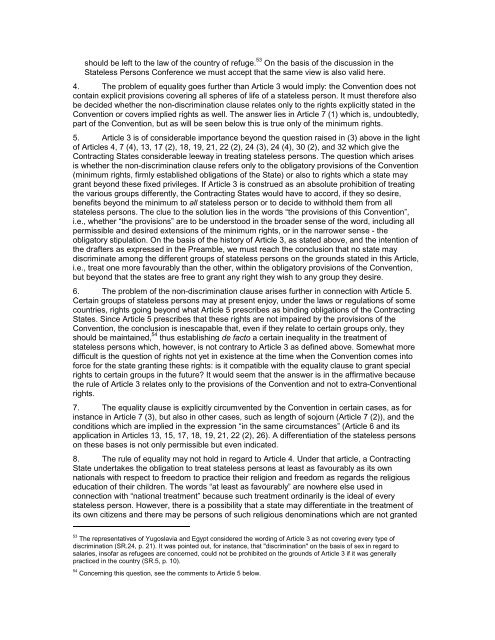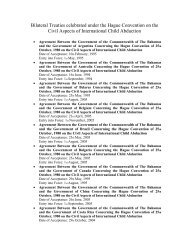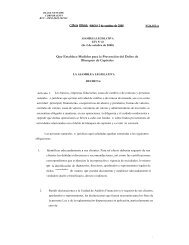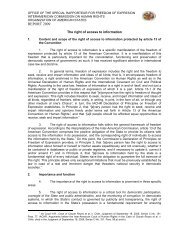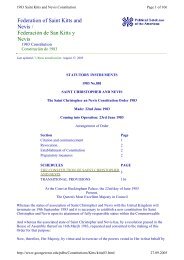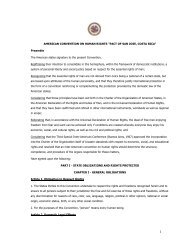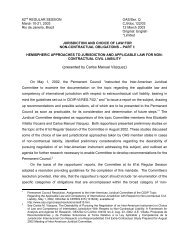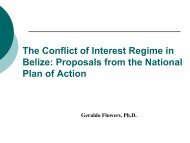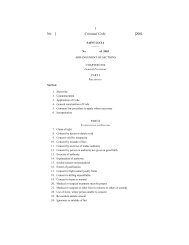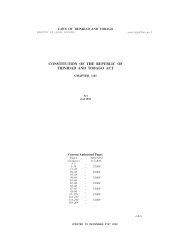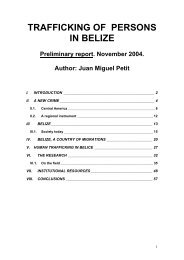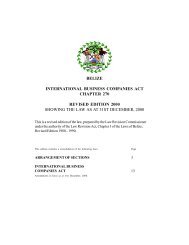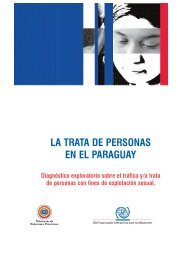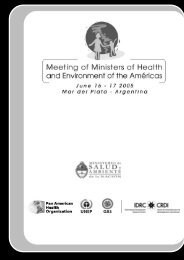CONVENTION RELATING TO THE STATUS OF ... - Refworld
CONVENTION RELATING TO THE STATUS OF ... - Refworld
CONVENTION RELATING TO THE STATUS OF ... - Refworld
Create successful ePaper yourself
Turn your PDF publications into a flip-book with our unique Google optimized e-Paper software.
should be left to the law of the country of refuge. 53 On the basis of the discussion in the<br />
Stateless Persons Conference we must accept that the same view is also valid here.<br />
4. The problem of equality goes further than Article 3 would imply: the Convention does not<br />
contain explicit provisions covering all spheres of life of a stateless person. It must therefore also<br />
be decided whether the non-discrimination clause relates only to the rights explicitly stated in the<br />
Convention or covers implied rights as well. The answer lies in Article 7 (1) which is, undoubtedly,<br />
part of the Convention, but as will be seen below this is true only of the minimum rights.<br />
5. Article 3 is of considerable importance beyond the question raised in (3) above in the light<br />
of Articles 4, 7 (4), 13, 17 (2), 18, 19, 21, 22 (2), 24 (3), 24 (4), 30 (2), and 32 which give the<br />
Contracting States considerable leeway in treating stateless persons. The question which arises<br />
is whether the non-discrimination clause refers only to the obligatory provisions of the Convention<br />
(minimum rights, firmly established obligations of the State) or also to rights which a state may<br />
grant beyond these fixed privileges. If Article 3 is construed as an absolute prohibition of treating<br />
the various groups differently, the Contracting States would have to accord, if they so desire,<br />
benefits beyond the minimum to all stateless person or to decide to withhold them from all<br />
stateless persons. The clue to the solution lies in the words “the provisions of this Convention”,<br />
i.e., whether “the provisions” are to be understood in the broader sense of the word, including all<br />
permissible and desired extensions of the minimum rights, or in the narrower sense - the<br />
obligatory stipulation. On the basis of the history of Article 3, as stated above, and the intention of<br />
the drafters as expressed in the Preamble, we must reach the conclusion that no state may<br />
discriminate among the different groups of stateless persons on the grounds stated in this Article,<br />
i.e., treat one more favourably than the other, within the obligatory provisions of the Convention,<br />
but beyond that the states are free to grant any right they wish to any group they desire.<br />
6. The problem of the non-discrimination clause arises further in connection with Article 5.<br />
Certain groups of stateless persons may at present enjoy, under the laws or regulations of some<br />
countries, rights going beyond what Article 5 prescribes as binding obligations of the Contracting<br />
States. Since Article 5 prescribes that these rights are not impaired by the provisions of the<br />
Convention, the conclusion is inescapable that, even if they relate to certain groups only, they<br />
should be maintained, 54 thus establishing de facto a certain inequality in the treatment of<br />
stateless persons which, however, is not contrary to Article 3 as defined above. Somewhat more<br />
difficult is the question of rights not yet in existence at the time when the Convention comes into<br />
force for the state granting these rights: is it compatible with the equality clause to grant special<br />
rights to certain groups in the future? It would seem that the answer is in the affirmative because<br />
the rule of Article 3 relates only to the provisions of the Convention and not to extra-Conventional<br />
rights.<br />
7. The equality clause is explicitly circumvented by the Convention in certain cases, as for<br />
instance in Article 7 (3), but also in other cases, such as length of sojourn (Article 7 (2)), and the<br />
conditions which are implied in the expression “in the same circumstances” (Article 6 and its<br />
application in Articles 13, 15, 17, 18, 19, 21, 22 (2), 26). A differentiation of the stateless persons<br />
on these bases is not only permissible but even indicated.<br />
8. The rule of equality may not hold in regard to Article 4. Under that article, a Contracting<br />
State undertakes the obligation to treat stateless persons at least as favourably as its own<br />
nationals with respect to freedom to practice their religion and freedom as regards the religious<br />
education of their children. The words “at least as favourably” are nowhere else used in<br />
connection with “national treatment” because such treatment ordinarily is the ideal of every<br />
stateless person. However, there is a possibility that a state may differentiate in the treatment of<br />
its own citizens and there may be persons of such religious denominations which are not granted<br />
53 The representatives of Yugoslavia and Egypt considered the wording of Article 3 as not covering every type of<br />
discrimination (SR.24, p. 21). It was pointed out, for instance, that "discrimination" on the basis of sex in regard to<br />
salaries, insofar as refugees are concerned, could not be prohibited on the grounds of Article 3 if it was generally<br />
practiced in the country (SR.5, p. 10).<br />
54 Concerning this question, see the comments to Article 5 below.


